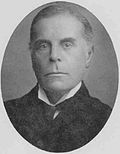| Newark | |
|---|---|
| County constituency for the House of Commons | |
 Boundaries since 2024 | |
 Boundary of Newark in the East Midlands | |
| Local government in England | Nottinghamshire |
| Electorate | 76,478 (2023) [1] |
| Major settlements | Newark-on-Trent, Southwell, Bingham |
| Current constituency | |
| Created | 1885 |
| Member of Parliament | Robert Jenrick (Reform UK) |
| Seats | One |
| 1673–1885 | |
| Seats | Two |
| Type of constituency | Borough constituency |
Newark is a constituency [n 1] in Nottinghamshire, England. It is represented by Robert Jenrick, of Reform UK who won the seat as a Conservative in a by-election on 5 June 2014, following the resignation of Patrick Mercer in April 2014. He defected to Reform UK in January 2026. [n 2]
Contents
- Boundaries
- Historic
- Current
- History
- Constituency profile
- Members of Parliament
- MPs before 1885
- MPs since 1885
- Elections
- Elections in the 2020s
- Elections in the 2010s
- Elections in the 2000s
- Elections in the 1990s
- Elections in the 1980s
- Elections in the 1970s
- Elections in the 1960s
- Elections in the 1950s
- Elections in the 1940s
- Elections in the 1930s
- Elections in the 1920s
- Elections in the 1910s
- Elections in the 1900s
- Elections in the 1890s
- Elections in the 1880s
- Elections in the 1870s
- Elections in the 1860s
- Elections in the 1850s
- Elections in the 1840s
- Elections in the 1830s
- See also
- Notes
- References
- External links

